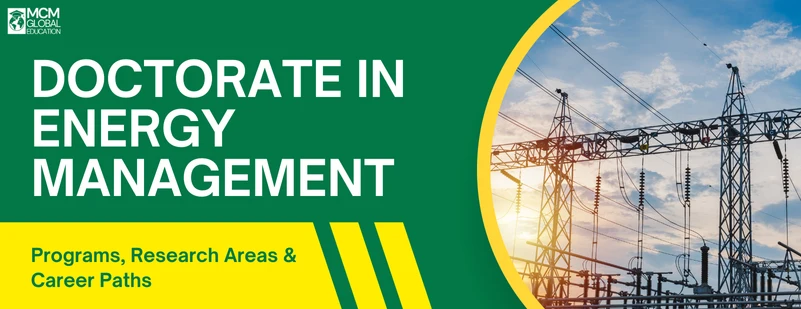The world is moving toward cleaner, smarter, and more efficient energy systems. As climate change, renewable adoption, and digital technologies reshape industries, the need for experts who can manage this transformation has never been greater. That’s where a Doctorate in Energy Management comes in.
This advanced degree equips students with the skills to lead research, design policies, and develop technologies that drive global energy transition. In this blog, we’ll explore everything you need to know—from curriculum and research opportunities to career paths and future trends.
Table of Contents
What Is a Doctorate in Energy Management?
A Doctorate in Energy Management (PhD or DBA) is the highest academic qualification in the field, focusing on advanced energy systems, policy frameworks, and sustainable solutions. Unlike a master’s degree, which emphasizes practical skills, a doctorate develops expertise in research, innovation, and leadership.
Graduates contribute to both academia and industry by addressing challenges such as:
- Renewable energy integration
- Energy efficiency in industry
- Smart grids and digitalization
- Energy policy and economics
Foundations & Core Disciplines
Energy management is not a narrow field—it’s an interdisciplinary domain. Doctoral candidates are expected to master a wide range of topics.
| Core Discipline | Focus Area |
|---|---|
| Systems Approach | Viewing energy as a complex system integrating economics, tech, and policy |
| Energy Systems & Materials | Renewables, energy storage, conversion devices, and advanced materials |
| Energy Informatics | Use of ICT, IoT, and AI for optimization of energy systems |
| Policy & Economics | Regulatory frameworks, carbon pricing, and market mechanisms |
| Behavioral Aspects | Understanding energy use and human decision-making |
This breadth ensures that doctoral graduates can analyze and innovate at both technical and systemic levels.
Smart Grids & Energy Infrastructure
A major focus area for anyone pursuing a Doctorate in Energy Management is the study of smart grids and infrastructure modernization.
Smart Grid Challenges
- Integration of renewables
- Decentralized energy generation
- Cybersecurity vulnerabilities
- Two-way communication between producers and consumers
Demand-Side Management (DSM)
Doctoral research often explores strategies to influence energy consumption:
- Time-of-use tariffs
- Peak-load shifting
- Automated demand response with IoT-enabled devices
Power Electronics and EV Integration
Emerging research topics include:
- Wide-bandgap semiconductors (SiC, GaN)
- Wireless charging systems
- Vehicle-to-grid (V2G) integration
Energy Management Systems & Software
Modern doctoral programs emphasize Energy Management Systems (EMS) and compliance with standards like ISO 50001.
| Feature | Purpose |
|---|---|
| Energy Audits | Identifying inefficiencies in industrial and building systems |
| Real-Time Monitoring | Tracking electricity, gas, and water usage via IoT sensors |
| Carbon Reporting | Measuring GHG emissions for sustainability compliance |
| Engagement Dashboards | Encouraging behavior change in organizations and cities |
| ISO 50001 Certification | Structured framework for continuous improvement in energy performance |
Doctoral students often research ways to improve or innovate EMS software, integrating AI, predictive analytics, and blockchain for transparency.
Economics, Policy, & Operational Strategy
A Doctorate in Energy Management isn’t just about technology. Understanding economics and policy is essential.
Research Topics in Energy Economics
- Impact of carbon pricing on renewable adoption
- Utility business models under decentralized generation
- Renewable subsidies vs. fossil fuel subsidies
- Cost-benefit analysis of energy efficiency measures
Policy and Operational Strategy
Students often explore:
- Energy transition pathways
- Climate legislation and policy design
- Utility regulation and rate-making
- Financial planning for large-scale energy projects
Industrial Energy Management & Emerging Trends
Industrial sectors consume over 30% of global energy. A doctorate prepares students to address industrial efficiency challenges.
Key Focus Areas
- Energy audits and retrofitting
- Smart manufacturing and Industry 4.0
- Digital twins for process optimization
- Integration of renewable energy into supply chains
Emerging Trends
- Decentralization: Growth of community-based energy projects
- Resilience: Building energy systems resistant to climate risks
- Circular Energy: Reusing waste energy streams
- Socio-technical Systems: Blending behavioral science with technology
Research Directions & Thesis Ideas
Choosing a thesis topic is one of the most critical steps in a Doctorate in Energy Management. Here are some trending directions:
| Research Area | Sample Thesis Topic |
|---|---|
| Renewable Energy & Storage | Economics of hybrid solar-wind-battery systems |
| Smart Grids | AI-driven load forecasting for demand response |
| Energy Policy & Economics | Evaluating carbon markets in emerging economies |
| Industrial Energy Efficiency | Digital twin models for reducing energy use in manufacturing |
| Advanced Materials | Next-gen thermoelectric materials for energy conversion |
| AI & IoT in Energy Systems | Deep learning for real-time optimization of smart buildings |
Structure of the Doctorate Program
Although program structures vary, most Doctorates in Energy Management follow a similar model:
1. Coursework
- Energy Systems Engineering
- Energy Economics & Policy
- Advanced Materials and Power Electronics
- Research Methodologies
2. Comprehensive Exam
Testing the breadth of knowledge in energy management.
3. Dissertation Research
Students contribute original knowledge through in-depth research.
4. Defense & Publication
Final presentation before an academic committee and publications in peer-reviewed journals.
Career Pathways & Impact
Graduates with a Doctorate in Energy Management enjoy diverse career opportunities:
| Career Path | Example Roles |
|---|---|
| Academia & Research | Professor, Postdoctoral Fellow, Research Scientist |
| Industry & Technology | Chief Sustainability Officer, Energy Consultant, Smart Grid Specialist |
| Government & Policy | Policy Advisor, Regulatory Analyst, Climate Strategy Specialist |
| Nonprofits & NGOs | Energy Justice Advocate, International Development Expert |
Global Impact
Doctoral graduates play key roles in:
- Achieving Net Zero 2050 goals
- Designing resilient energy systems
- Shaping sustainable policies that balance economics with climate needs
Conclusion
A Doctorate in Energy Management is more than an academic achievement—it’s a commitment to solving some of the most pressing global challenges. Whether your passion lies in renewable energy, smart grids, industrial efficiency, or policy innovation, this degree opens doors to impactful careers in academia, industry, and government.
With the right program and research focus, you’ll not only advance your own career but also contribute to shaping a sustainable energy future.























